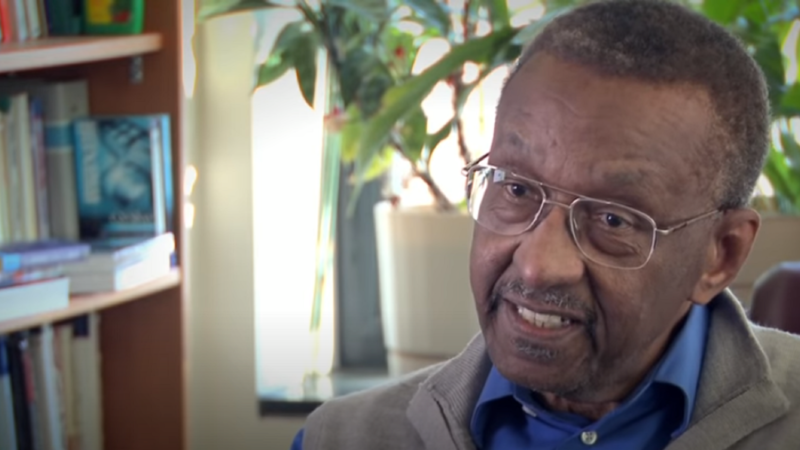'I Just Do My Own Thing': Walter Williams, RIP
The self-described "crazy-ass man" and libertarian economist focused on government's role in perpetuating racial inequality.

I'm saddened to write of the death of libertarian economist Walter E. Williams. He passed away Wednesday morning at the age of 84, less than a day after teaching a class at George Mason University, where he worked for 40 years and helped transform his department into a highly respected center of free market scholars. A popular syndicated columnist whose work appeared in over a hundred newspapers on a weekly basis, he was a long-time contributor to Reason and served as an emeritus trustee of Reason Foundation, the nonprofit that publishes this website.
Williams was so libertarian that he refused to accept the term as a descriptor. I interviewed him in 2011 and asked him whether he saw himself as part of the libertarian movement to which he had contributed so much. No, he said. "I just do my own thing."
Born in Philadelphia in 1936, Williams grew up as a neighbor to Bill Cosby in the city's racially segregated housing projects and was drafted into the peacetime Army during the Cold War. A self-described "crazy-ass man who insisted on talking about liberty in America" long before he was a public intellectual, the racist violence and abuse he suffered at the hands of police, military officers, and other authorities informed much of his work. In his powerful, evocative 2010 memoir, Up From the Projects, he recounts the time when, as a cab driver in the City of Brotherly Love, he was ordered out of his cab by a white officer, beaten up, and then charged with disorderly conduct. He wasn't thrilled about being drafted and being sent to a base in pre-integration Georgia. Disgusted by the pervasive racism he encountered in the military, Private Williams wrote to his commander in chief, President John F. Kennedy:
"Should Negroes be relieved of their service obligation or continue defending and dying for empty promises of freedom and equality… Or should we demand human rights as our Founding Fathers did at the risk of being called extremists….I contend that we relieve ourselves of oppression in a manner that is in keeping with the great heritage of our nation."
His two best-known works are probably 1982's The State Against Blacks and 1989's South Africa's War Against Capitalism, both of which focused on the ways that governments systematically constrained the basic rights and freedoms of racial minorities by denying them opportunities to live and work however they saw fit. In a 1978 article for Reason titled "The New Jim Crow Laws," he wrote:
Society is coming to view the difficulty that today's minorities face in entering the mainstream of society as a manifestation of group incompetence. Hardly anyone acknowledges that many, if not most, of the problems encountered are due neither to group nor to individual incompetence but rather are due to the excesses of governments dominated by politically powerful interest groups.
The state, Williams argued, typically forced blacks into hopeless situations, provided ineffective relief, and then blamed the victims for failing to rise above their circumstances, all while consolidating power into elite hands. Seemingly beneficial interventions such as minimum wage laws that priced unskilled blacks out of the labor markets, public housing in crime-ridden projects, and mandatory schooling at terrible public institutions were particularly pernicious because they came wrapped in a rhetoric of beneficence.
Williams was also a contrarian. He attacked discrimination by the state but defended the rights of private citizens to exclude whomever they wanted for whatever reason. A public library, he said, couldn't discriminate, but a private library could turn away anyone it wanted to. From our 2011 interview:
One of my strong values is freedom of association. If you believe in freedom of association, you have to accept that people will associate in ways that you find offensive. I believe people have the right to discriminate on any basis they want, so long as they're not using a government [to do so].
Williams had a great flair for the apocalyptic. In his columns and during stints guest-hosting for Rush Limbaugh, he would often argue that America had irrevocably lost its way, especially when it came to defending the economic freedom that he believed was essential to rising living standards. If his rhetoric ran hot, he nevertheless asked questions that are well worth considering a decade after the Great Recession and in the midst of a medically induced economic coma.
Are we so arrogant…to think that we are different from other people around the world?… How different are we from the Romans, who went down the tubes, or the British, or the French, or the Spanish, or the Portuguese? These are great empires of the past, but they went down the tubes for roughly the same things that we're doing. Liberty is the rare state of affairs in mankind's history, arbitrary abuse and control by others is the standard dish even now. All the tendencies are for us to have greater and greater amounts of our liberty usurped by government.
If we are not as far down the road to serfdom as he feared, it's in good part due to his voluminous writings and appearances which were by turns impassioned, funny, insightful, and memorable as hell. Walter E. Williams, rest in peace.
Here's the 2011 Reason interview with him.


Show Comments (45)